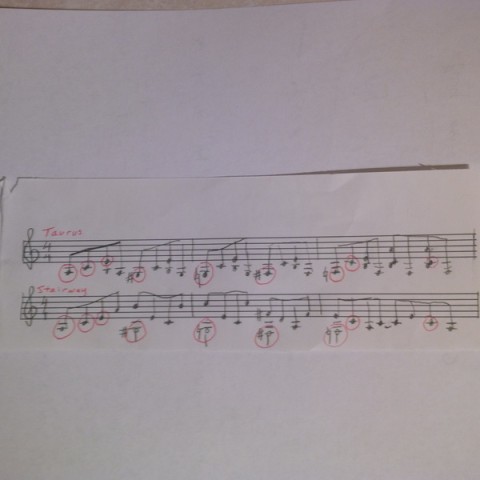I’m flabbergasted! The jury got it right!
Whereas an internet full of ordinary observers certainly didn’t. Nor did the ordinary observer friends that I personally polled on the matter. “Ordinary observer” by the way is the standard often used to help define infringement. That is, “does the allegedly infringing work appear or sound substantially similar to the ordinary observer?” And this as opposed to an observer more “expert.” Every single person for whom I played the two key segments agreed, “If Taurus came before Stairway, then Stairway was clearly stolen from Taurus,” with one friend adding for emphasis, “and nothing you say will convince me otherwise.”
I was sure there’d be a last minute confidential settlement. I couldn’t imagine why Zeppelin would chance a jury with this. But they did and they won.
Why did the jury reach a different conclusion from nearly everyone else? It’s unsettlingly simple. The jury wasn’t allowed to listen to the recordings. If they had, in my estimation, they’d have gotten it wrong like all my friends and most of the internet. The two respective recordings sure sounded “substantially similar” to these ordinary observers, and this would’ve overwhelmed all the right minded musicology I’m about to show you. This one factor alone swung the whole thing.
Instead, for the most part the jury had to look at the sheet music.
Now you’re thinking, “Who cares what the sheet music says?! If it sounds the same, it’s the same! We don’t play sheet music on the radio. Music is sound! How it sounds is what’s important!” And that’s certainly how Marvin Gaye’s estate won a big judgement against Thicke and Pharrell over “Blurred Lines” which sounded a lot like “Got To Give It Up.” But it was a big and wrong judgement.
Let’s mislead ourselves for a moment. Here is what this case sounds like.
Yup, Taurus and Stairway sound substantially similar. And they are substantially similar! But sometimes that standard is just dumb. On paper, on the sheet music, this case’s two most relevant analysis approaches lead to a Zeppelin verdict. And I’ll explain.
The first approach, simply stated, goes something like this… “Hey, there are a whole lot of similar notes in these few bars, so let’s count them up and see if it’s compelling.” I was going to write out the parts, but found that stevehoffman.tv already had so for now I’ll share his. See the notes he circled in red? Those are same notes falling on same beats.

I think this is the approach the plaintiffs probably took. See those first three notes? They’re identical. And if I play you those first three notes on a guitar, you’ll immediately recognize that I’m playing “Stairway.” But the problem with the “lots of similar notes” approach is that it looks at every picked guitar note as though they’re all musically significant, and thus invites the compelling counterargument as to the sort of notes many of these are. Not what notes they are, but what musical function they serve. They’re mostly arpeggiations of chords, which means they function to establish harmony over the course of a few musical beats, rather than being sounded simultaneously. It’s like guitar picking rather than guitar strumming, but they paint a similar color. They say, “this is the chord we’re using here to give the melody a context, harmonically and rhythmically.” In terms of composition this means a lot. I’d argue at least 75% of these notes are relatively insignificant and not protectable. It’s only a chord. Like a color. Even a series of chords can almost never reasonably be protected. Chords progressions like the one employed substantially by Taurus and by Stairway To Heaven but also by familiar tunes like My Funny Valentine and This Masquerade, are the building blocks of western music established over centuries. They’re not poetry. They’re the language itself.
This video shows similar language in varying degrees Stairway-like.
Let’s step back here and consider that musical language is exactly what you can write down on sheet music. Then someone might play that composition on a kazoo or a tuba or on a guitar. The jury wasn’t allowed to hear the similar arpeggios played in the same key on the same instrument in the two different songs. They were denied the confusion this might’ve created in their ordinary observer ears. The similarities of the acoustic guitars would’ve been a haze too thick for a jury. It’s being characterized as unjust, but it’s clarifying.
The other even more damning analysis would be to distill from all those arpeggios the key notes that might be the true melody notes — those that most define the musical phrases, separating them from the less meaningful arpeggio notes that are just spelling out harmony, reducing those to accompaniment. Then you’d have melody and you’d have accompaniment. This argument could be illustrated by playing a piano arrangement that hit those key notes faithfully, but altered all the others, applying some musicality all the while, and asking, perhaps of a Spirit fan, “Is that still Taurus?” And it would be. And then after your Stairway rendition, of that same Spirit fan “Is that still Stairway?” And again, it would be. But then the tolling blow, Taurus would find ALMOST ZERO common tones among those two distilled melodies.
http://on.wsj.com/28SSTGs